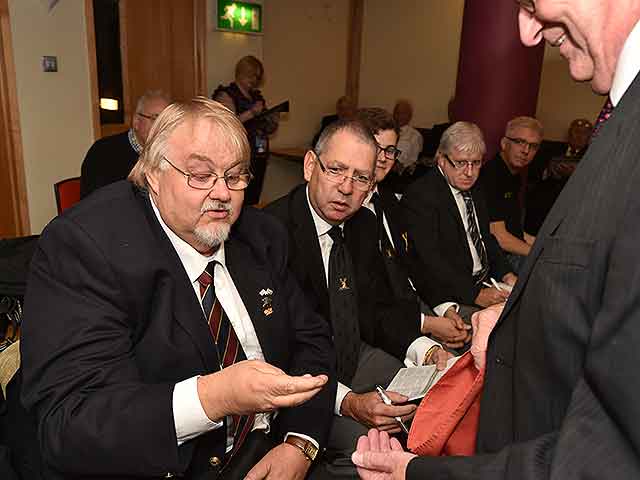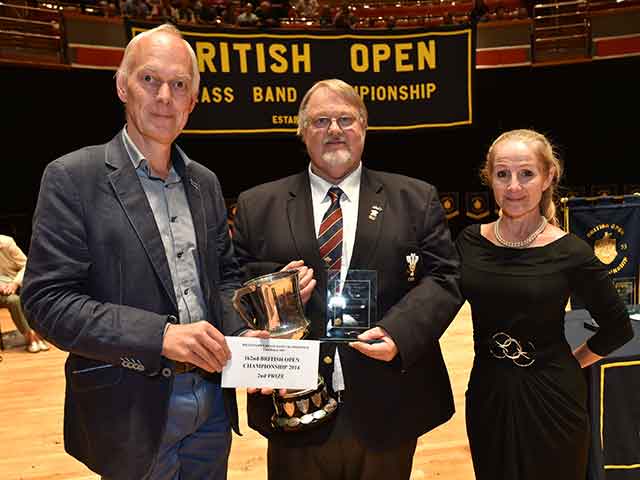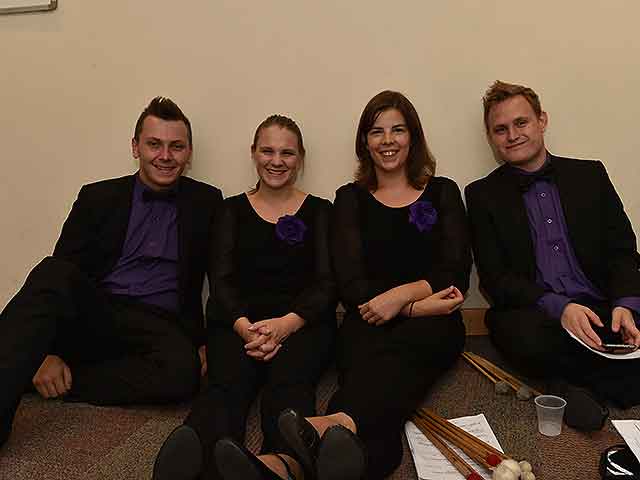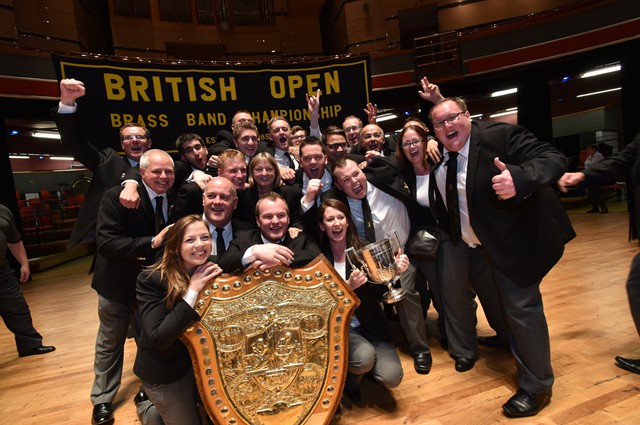
Black Dyke youth enjoys the winning experience...
Although he would be loathe to accept the comparison himself, there is a touch of Arsene Wenger about the way Prof Nicholas Childs has maintained his musical philosophy with Black Dyke over the past 14 years.
A lifelong Manchester United fan, the Queensbury band Director of Music’s insistence on building the foundation of future success on the blossoming talent of youth has echoes of the Frenchman’s own stubbornly held aesthetic beliefs at the Emirates Stadium.
There have of course been the same frustrations and occasional false dawns along the way since the last domestic ‘major’ success in 2009 - although unlike the Gunners boss, he has enjoyed European glory.
And whilst a single Yorkshire Area title is a bit like gaining the bragging rights after a North London derby and the English National eventually had the cache of the League Cup win, like Wenger, he has never been swayed to change his beliefs by the type of poisonous opprobrium and cries for resignation by ‘celebrity fans’ such as the execrable Piers Morgan.
Long game
Pondashers have understood the Welshman’s adherence to the principles of the ‘long game’ so to speak (if that is not mixing the football metaphor too far) - and so now Black Dyke fans the world over can celebrate winning the brass band version of the ‘Premiership’ once again.
Even his rivals couldn’t help but admire the sheer guts and determination it took under pressure when his personal philosophy in promoting and developing youth paid off in such glorious fashion at Symphony Hall on the weekend.
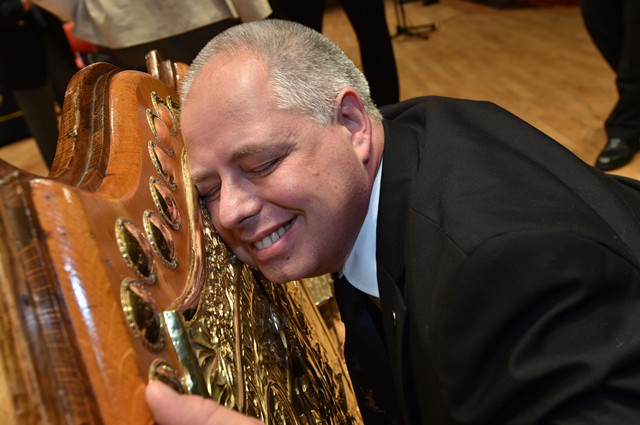
Welcome back...
Back to its best
It was a victory that saw Dyke back to its best: The adherence to huge dynamic contrasts, sweeping lyrical lines, tonal balance, fizzing technical proficiency and a touch of crafty on pitch husbandry. It was the band that played the notes but it was the MD who orchestrated their delivery.
‘Vita Aeterna Variations’ certainly suited the MDs inherent musical beliefs (he did win on its first incarnation at the 2012 Euros of course) - allowing him scope to carefully mould the most intricate of phrases, reveal forensic detail and give his young charges the flexibility and confidence to express themselves when given the opportunity.
It may have been two of the more experienced ‘youngsters’ in Zoe Hancock and Gary Curtin who took deserved individual awards, but others such as Jonathan Bates on horn and Benjamin Richeton on soprano also came of age. The old heads of Richard Marshall, Phil Goodwin and Brett Baker must have sat back and enjoyed the armchair ride, as the young tyros reveled in the spotlight.
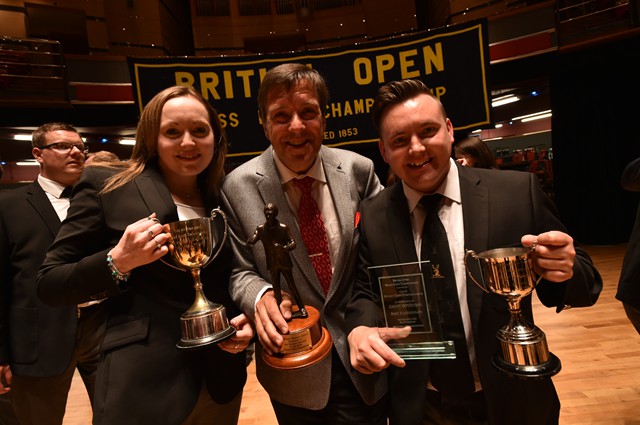
Award winning trio: Zoe Hancock, Prof Nicholas Childs and Gary Curtin
No doubt
By the time the final chord rang out and the packed audience showed its full throated acclamation in return, the three men in the box had no doubt that they had a new leader on their hands from the number 13 draw.
Unbeknown to them, the last of the heavyweight contenders of Brighouse & Rastrick, Tredegar and Fairey that followed Dyke to the stage were destined to endure frustratingly inconsistent performances, whilst the likes of Cory, Foden’s and Grimethorpe had already given of their best.
Destined
The MDs smile as he left the stage told the tale - a mix of pride, purpose and passion. In his post performance interviews he was relaxed, confident and happy.
He knew only fate could deny his band now - and for the first time since 2006, it smiled benevolently and deservedly upon him: The magnificent British Open Gold Shield was destined to head to Black Dyke’s home ground in Queensbury for a thirtieth time.
A little later, his personal confirmation came in the form of a third bronze Mortimer Maestro Trophy, which was clasped in his hands like a football manager ready to uncork a bottle of celebratory Veuve Clicquot.
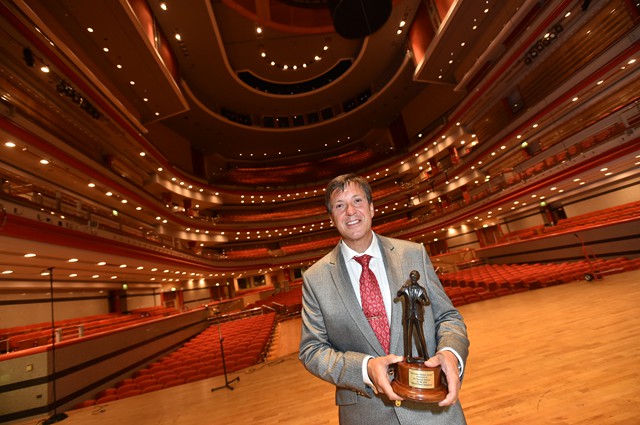
A man alone with his personal prize...
Omerta
A memorable contesting day had got off to a bit of an incendiary start at the draw - with Grimethorpe plucking the dreaded number 1 from the velvet bag.
The rather unfortunate squeal of relief at their misfortune from one band rep was met by a collective stare of cold eyed disapproval from fellow competitors, as the unwritten code of ‘schadenfreude omerta’ was broken (although they later apologised to the organisers). Thankfully, no body was found swimming with the fishes in the nearby canal as the banding heavies left the draw quietly counting their lucky stars and sticky fingers.
Grimethorpe’s brave response an hour or so later was to produce an engaging performance that like many from the pre-contest fancied runners (batched together in the final third of the contest) was blighted by frustrating minor errors. They were not alone.
Sticky fingers work well for Austin Davies of Cory...
Broad scope
‘Vita Aeterna Variations’ gave broad scope for interpretation - the opening statement marked ‘senza rigore’ allowing conductors to indulge in varying degrees of elastic malleability that at its best meandered suavely, but at its worse came almost grinding to a lachrymose halt.
As expected, the majority of bands overcame the obvious technical hurdles without too much difficulty (up until the fugue and finale that is), but it was a different matter when it came to style - especially lyrical style.
Frowned upon
Forcefulness was frowned upon (some of the percussion effects were as explosive as licking a jalapeño chili dipped in cordite) with the performances that caught the attention in the box emphasising the dynamic contrast, rhythmic pulse and a sense of foreboding energy with a more subtle implosion on the taste buds.
Meanwhile, the very best soloists played with a finesse that enabled the conductor to frame the music with a stillness that echoed the melancholic thoughts of loss.
By the time bands reached the fiendish fugue (which all too often simply failed to gel between connected lines) and stamina sapping apotheosis, thoughts of a very different kind of loss had seeped though minds and into lips, as a number of performances fell away soaked in lactic acid.
Runner-up for a second year for Cory
Fully deserved
Few would have argued with the judges that the top three bands fully deserved their podium placings.
In their opinion, the difference between Black Dyke and Cory was marginal but defined, with Flowers just a yard or two behind; the Welsh band’s immensely impressive rendition of power, precision and sheer excitement tarnished only by the merest hints of singular discomfort.
That was certainly not the case with Steve Stewart, who was the pick of the hard worked soprano cornets on the day. His delicate filigree work in the fugue was a joy to behold as he deservedly claimed the Brian Evans Trophy for a second time.
If victory could have been secured on emotion alone, the famous shield would have been heading back to South Wales well before Philip Harper’s baton flew into the air like Bernie the Bolt’s arrow on the Golden Shot. There was an aching sense of beauty to the two reflective variations.
A comprehensive look of confidence from Flowers MD Paul Holland
Phlegmatic contrast
In contrast, a much more phlegmatic, boldly confident approach by Flowers saw them secure a fine third place with a sense of compactness that few matched so comprehensively on the day.
Intelligently led by Paul Holland, who placed great emphasis on ensemble cohesiveness before tastefully relaxing the tension on the leash to allow David Childs and fellow soloists to showcase their full array of talents, it was a performance that left no one in any doubt that it would be in the mix come the announcement the results.
My word, it was mightily impressive stuff; the type of substantial major contest marker that should send a shudder up the spines of higher ranked rivals ahead of the Albert Hall. On this form they are more than capable of pushing even closer for the ultimate major prizes.
A very individual sake on things from Desford...
Wake
The likes of Brighouse, Grimethorpe, Fairey and defending champion Tredegar (all at London) were left in their wake, as they produced inconsistent accounts that never quite seemed to have the same well rehearsed sense of controlled execution.
Elsewhere Foden’s poor opening cost them dearly, despite a superb effort to catch the heels of the top three with a spirited recovery full of taut musicality (with perhaps the best fugue of the day), whilst there was also reward for tasteful individuality and musical refinement for Desford and Hammonds Saltaire in fifth and sixth.
Smiles all round for Hammonds Saltaire MD Morgan Griffiths
Finely judged
Tom Davoren’s finely judged individualistic interpretation, with its admirable risk taking certainly left a lasting impression on listeners from the early number 4 draw, whilst the contest was rounded off with an equally engaging take from Morgan Griffiths which stuck to its musical guns despite the odd minor blip or two.
Despite the misfiring dreadnoughts filling the remaining top ten places, there was still a defined gap to the rest of the field - with Leyland topping the midfield finishers with a performance that just did enough (despite the MDs efforts to bring out the lyrical content of the score) to secure their British Open future but no more, whilst Mareika Gray drew yet another performance of immense character and spirit from Milnrow to beat the drop back to the Grand Shield.
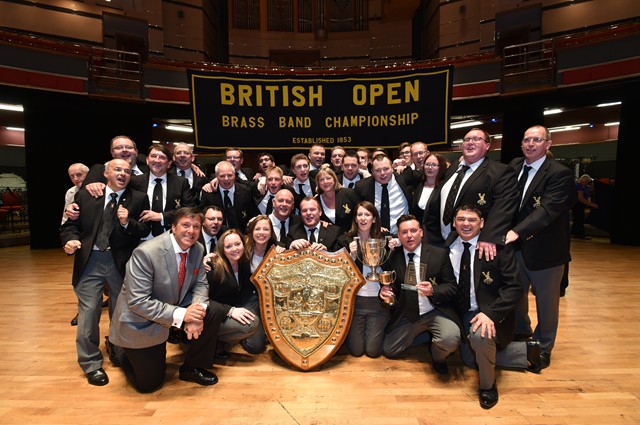
Mission accomplished...
Paid the price
The trio of Co-operative Funeralcare, Carlton Main Frickley and Kirkintilloch will rue a mix of early draws and obvious inconsistency as they contemplate producing a possible top ten finish next year if they are not to join Virtuosi GUS and Hepworth, both of whom sounded far from their best and paid the price, on the Golden Mile in Blackpool.
For Black Dyke and Prof Nicholas Childs the motivation for more golden success remains - even though the philosophy of how to achieve it has been fully and magnificently justified.
What Arsene Wenger would give for that.
Iwan Fox and Chris Thomas



